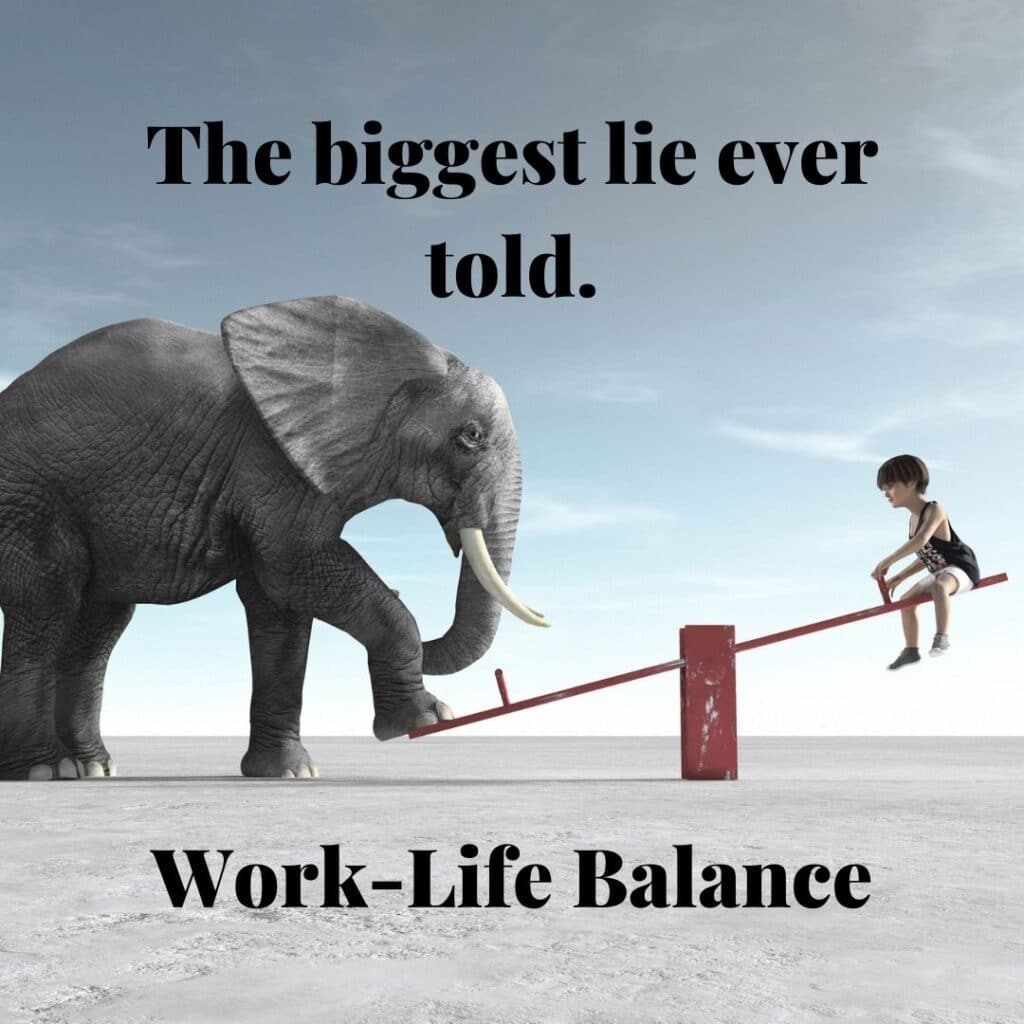Work-life balance was never a thing. The only thing that came from trying to achieve it was the overwhelming feeling of failure. Work-life balance is incredibly pointless as we march into 2021. The pandemic has forced us to admit balance isn’t the way to organize work and life. Further, it was never a good idea from the get-go. The definition of insanity is doing the same thing over and over while expecting different results. Isn’t it time to stop pursuing the myth of work-life balance?
History of Work-Life Balance
Defining work-life balance is no easy task. It involves evaluating how people manage their time in and out of the office. Work-life balance includes relationships, family responsibilities, and other outside interests or hobbies. The methods someone uses to juggle work and life demands constitute their balance. Work-life balance started buzzing around the workplace in the 1970s and 80s. It became a thing because baby boomers became stressed trying to balance career, family, and other life areas.
While the definition may seem straightforward, working professionals everywhere have such a hard time defining how it applies to them. More importantly, they fail to achieve it. Those who braved pursuing it find a complicated journey littered with articles and claims on finding it. In the end, the attempts amount to nothing more than an overwhelming sense of failure. Pursuing a work-life balance also brings frustration, anger, and resentment.
Why Is Work-Life Balance a Lie?
That is a great question! First, laptops started appearing in offices in 1999, which meant people started to take their work home and while traveling. Secondly, Blackberry gained popularity in 2003, which gave working professionals 24/7 access to email. Consequently, it gave their co-workers 24/7 access to them. As a result, by 2003, achieving work-life balance became technologically impossible for some professionals.

Finally, in 2007 the Apple iPhone went on sale, and that was the nail in the coffin of work-life balance. Yet, despite the technological advances that brought work to the home, work-life balance as a concept, goal, and in some cases, initiatives picked up traction. HR leaders everywhere were soon pushing collateral on its importance out to their organizations. Work-life balance became a goal for many workplaces, that is until it meant someone was unreachable or unresponsive after-hours.
What Are Other Options for a Balanced Life?
If pursuing work-life balance brings frustration, anger, resentment, and the overwhelming feeling of failure, what should we focus on instead? Work-life integration or work-life blend. Stop trying to balance work and life. Instead, focus on removing the boundaries that separate the two so they coalesce to form a whole.
There are over 1,340,000,000 results when you Google “bring your whole self to work.” While some would argue this is another corporate buzz word, it means to be who you are at home while at work. I think this is another reason to pursue work-life fusion over work-life balance. We aren’t a different person at work than we are at home. We do work tasks at home, so we should do home tasks while at work.
Additionally, the work from home situation caused by COVID-19 has further helped work encroach into many working professionals’ home lives making work-life balance even more unattainable. Therefore, it has to be about blending priorities. Somedays will bring a little more focus on work priorities, and other days will bring more focus to life priorities. There is no need to find balance; just blend based on your needs.
Most importantly, work-life blend is an empowering mindset. It creates an opportunity for the “and” in life rather than either/or as in work-life balance. It is kind of like having your cake and eating it too. To successfully blend work and life, you must first make a conscious decision. It requires you to become intentional about how much and when to pour yourself into work or life activities. Make that choice quickly and without feeling guilty. Every day will be different since your priorities will vary from one day to another.
How Do You Work-Life Blend?
- Know your priorities – make a list of four to six priorities, which can include yourself, loved ones, hobbies, career, etc. List them from most to least important.
- Develop a list of non-negotiables – these are priorities you must do a majority of the time. An example would be to leave the office by 6 pm one night a week.
- Put your non-negotiables on your schedule – leverage Outlook or Google calendar to keep you on track to honor them.
- Define your blend – work-life blend is unique to each person; therefore, you have to define its meaning for you. Keep in mind there will be times of misalignment, so the key is to continue to strive to achieve your definition of blended life.
- Empower yourself and don’t beat yourself up – periodically reflect on your priorities and how well you’ve honored them. You will need to course-correct from time to time, so don’t be too hard on yourself when you are in an unhappy blend.
It is important to note that both work-life balance and blend are subjective. Your life and journey are unique to you. Furthermore, the stage you are at in your life or career also is unique to you. Therefore, you are the only person who can determine which concept works for you.


